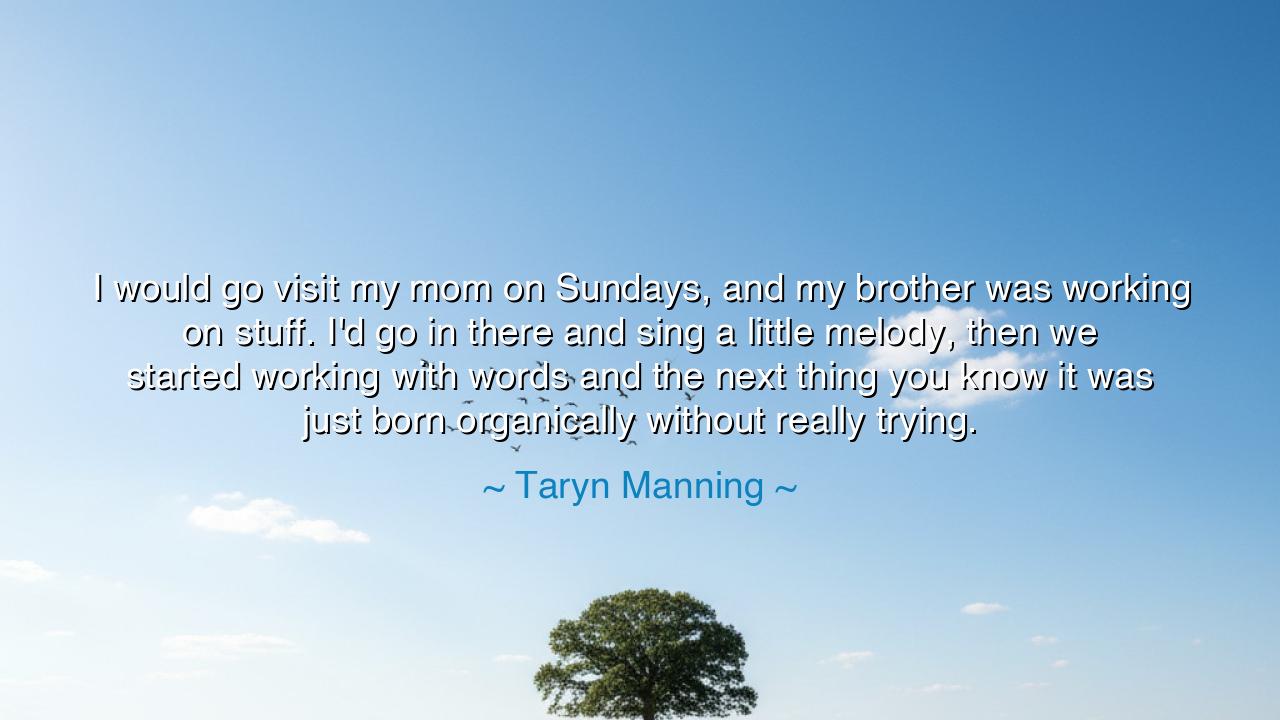
I would go visit my mom on Sundays, and my brother was working on
I would go visit my mom on Sundays, and my brother was working on stuff. I'd go in there and sing a little melody, then we started working with words and the next thing you know it was just born organically without really trying.






Hear, O children of creation and keepers of the song within, the words of Taryn Manning, who spoke with the innocence of memory and the depth of truth: “I would go visit my mom on Sundays, and my brother was working on stuff. I'd go in there and sing a little melody, then we started working with words and the next thing you know it was just born organically without really trying.” This is no mere recollection of family time, but a revelation of how art is often born—not in calculation or ambition, but in the natural rhythm of love, presence, and play.
The meaning of her words lies in the sacred simplicity of creation. She did not set out to write a song with a plan or a contract; it came forth in the everyday flow of family life. A visit to her mother, the presence of her brother, a small melody hummed without effort—these were the sparks. And like fire springing from flint, the song was born organically, as if it already existed and was simply waiting to be discovered. This is the essence of true art: it often arises not when forced, but when allowed.
History is filled with echoes of this truth. The great poet Samuel Taylor Coleridge spoke of how his famous poem Kubla Khan came to him in a dream, flowing like water until he was interrupted. The hymn “Amazing Grace,” too, was not crafted in the halls of power but born from the humble repentance of John Newton, spoken first as a testimony before it became a song. Such works endure because they are not forged in ambition but gifted in moments of sincerity, carried forth by the current of life itself.
There is also in Manning’s reflection the reminder of the power of family in creation. Her brother working, her mother nearby, the comfort of Sunday visits—all of this created the soil in which music could grow. Greatness does not always require solitude or distant travels; sometimes it is found in the presence of those we love, in the ordinary spaces we overlook. The family hearth has birthed as many songs as the grandest stages, for where love is present, creation is near.
The lesson here is radiant: do not strive so desperately for genius that you forget to live. For often it is in living—visiting, laughing, humming, sharing—that genius comes. To sit with others in simplicity, to let the heart sing without fear of failure, is to open the door through which inspiration may enter. Manning reminds us that creation is not always conquered; it is invited. And those who know how to invite it gently often find themselves blessed with its presence.
The warning is also clear: to over-engineer the act of creation is to choke it. Many chase after art with clenched fists, demanding brilliance, and in their striving, they lose the very breath that gives art life. The song that comes “without really trying” is often truer than the one calculated for perfection. This does not mean that work and craft are useless, but that they must flow from inspiration, not smother it.
As for practical action, cultivate space in your life for organic creation. Spend time with those who bring you peace. Let melodies come unbidden, let words rise naturally, let ideas grow without fear of judgment. Carry a notebook, hum aloud, trust the little sparks of inspiration. And above all, do not dismiss the small beginnings—for in a single hummed melody, an eternal song may be waiting.
Thus, Manning’s words endure as a teaching: the greatest creations are often born without striving, from love, family, and the quiet flow of life. Let us then honor simplicity, cherish presence, and remember that art is not only made, but also received—as a gift from the heart to the world.






AAdministratorAdministrator
Welcome, honored guests. Please leave a comment, we will respond soon